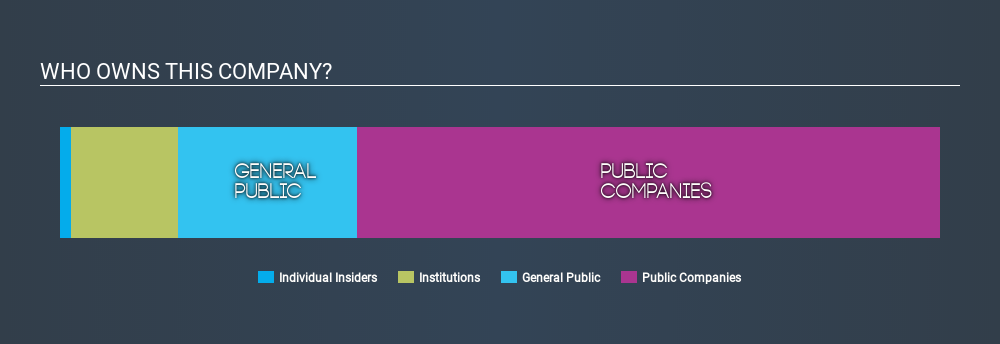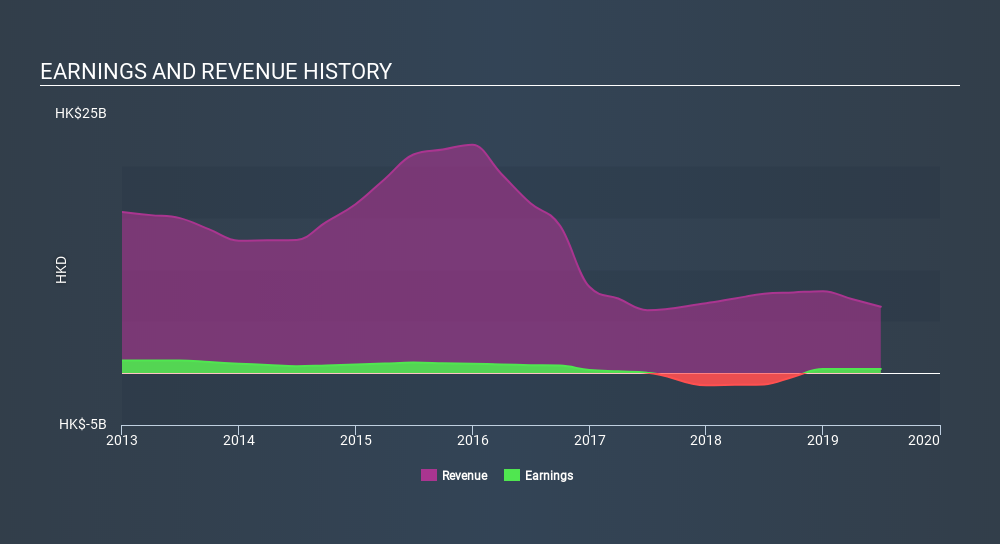- Hong Kong
- /
- Wireless Telecom
- /
- SEHK:215
What Kind Of Shareholder Owns Most Hutchison Telecommunications Hong Kong Holdings Limited (HKG:215) Stock?

Every investor in Hutchison Telecommunications Hong Kong Holdings Limited (HKG:215) should be aware of the most powerful shareholder groups. Institutions often own shares in more established companies, while it's not unusual to see insiders own a fair bit of smaller companies. Companies that used to be publicly owned tend to have lower insider ownership.
Hutchison Telecommunications Hong Kong Holdings has a market capitalization of HK$7.5b, so we would expect some institutional investors to have noticed the stock. Taking a look at our data on the ownership groups (below), it's seems that institutions own shares in the company. Let's take a closer look to see what the different types of shareholder can tell us about 215.
Check out our latest analysis for Hutchison Telecommunications Hong Kong Holdings

What Does The Institutional Ownership Tell Us About Hutchison Telecommunications Hong Kong Holdings?
Many institutions measure their performance against an index that approximates the local market. So they usually pay more attention to companies that are included in major indices.
As you can see, institutional investors own 12% of Hutchison Telecommunications Hong Kong Holdings. This implies the analysts working for those institutions have looked at the stock and they like it. But just like anyone else, they could be wrong. If multiple institutions change their view on a stock at the same time, you could see the share price drop fast. It's therefore worth looking at Hutchison Telecommunications Hong Kong Holdings's earnings history, below. Of course, the future is what really matters.

Hedge funds don't have many shares in Hutchison Telecommunications Hong Kong Holdings. Quite a few analysts cover the stock, so you could look into forecast growth quite easily.
Insider Ownership Of Hutchison Telecommunications Hong Kong Holdings
The definition of company insiders can be subjective, and does vary between jurisdictions. Our data reflects individual insiders, capturing board members at the very least. Management ultimately answers to the board. However, it is not uncommon for managers to be executive board members, especially if they are a founder or the CEO.
Insider ownership is positive when it signals leadership are thinking like the true owners of the company. However, high insider ownership can also give immense power to a small group within the company. This can be negative in some circumstances.
Our most recent data indicates that insiders own some shares in Hutchison Telecommunications Hong Kong Holdings Limited. In their own names, insiders own HK$103m worth of stock in the HK$7.5b company. Some would say this shows alignment of interests between shareholders and the board. But it might be worth checking if those insiders have been selling.
General Public Ownership
The general public holds a 20% stake in 215. This size of ownership, while considerable, may not be enough to change company policy if the decision is not in sync with other large shareholders.
Public Company Ownership
Public companies currently own 66% of 215 stock. It's hard to say for sure, but this suggests they have entwined business interests. This might be a strategic stake, so it's worth watching this space for changes in ownership.
Next Steps:
While it is well worth considering the different groups that own a company, there are other factors that are even more important.
I like to dive deeper into how a company has performed in the past. You can find historic revenue and earnings in this detailed graph.
Ultimately the future is most important. You can access this free report on analyst forecasts for the company.
NB: Figures in this article are calculated using data from the last twelve months, which refer to the 12-month period ending on the last date of the month the financial statement is dated. This may not be consistent with full year annual report figures.
If you spot an error that warrants correction, please contact the editor at editorial-team@simplywallst.com. This article by Simply Wall St is general in nature. It does not constitute a recommendation to buy or sell any stock, and does not take account of your objectives, or your financial situation. Simply Wall St has no position in the stocks mentioned.
We aim to bring you long-term focused research analysis driven by fundamental data. Note that our analysis may not factor in the latest price-sensitive company announcements or qualitative material. Thank you for reading.
About SEHK:215
Hutchison Telecommunications Hong Kong Holdings
An investment holding company, provides mobile communication services.
Flawless balance sheet and slightly overvalued.

